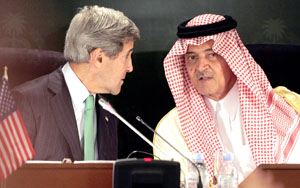
Fresh clashes between Iraq‘s security forces and anti-government protesters broke out in Baghdad on Friday despite a call for calm by the country’s top Shia leader, as authorities grapple with the country’s biggest crisis in years.
Security forces fired tear gas and threw stun grenades into crowds of protesters wearing helmets and makeshift body armour on a main road in the middle of the Iraqi capital, sending demonstrators scattering, some wounded, according to Reuters News Agency.
More:
More than 260 people have been killed since the protests over a lack of jobs and services began in Baghdad on October 1 and quickly spread to southern provinces, according to police and medics. Security forces have used live gunfire against mostly unarmed protesters since the beginning of the unrest.
Grand Ayatollah Ali al-Sistani, who only speaks on politics in times of crisis and wields enormous influence over public opinion in Shia-majority Iraq, held security forces accountable for any violent escalation and urged the government to respond as quickly as possible to demonstrators’ demands.
“The biggest responsibility is on the security forces,” a representative of al-Sistani said in a sermon after Friday prayers in the holy city of Karbala. “They must avoid using excessive force with peaceful protesters.”
Reporting from Baghdad, Al Jazeera’s Mohamed Jamjoum said that the atmosphere in Tahrir Square was “one of resolve” as demonstrators were unfazed by the violence.
“The protesters are committed to continue to deliver a message to the government that they will keep coming out onto the streets until they are provided basic services and corruption comes to an end.”
‘Won’t make a difference’
Protesters, some of whom view al-Sistani as part of the political and religious system they say is the cause of many Iraqis’ misery, took little solace from the scholar’s words.
“He says he’s supporting protests and that we should keep going, but he hasn’t helped. The speech won’t make a difference either way,” said one woman protesting in Baghdad whose son was killed in recent clashes.
“I’m the mother of a student. They took his life,” she told Reuters, giving her name as Umm al-Shaheed, Arabic for mother of the martyr.
The demonstrators, mostly unemployed youths, demand an overhaul of the political system and a corrupt ruling class which has dominated state institutions since the US-led overthrow of Saddam Hussein in 2003.
Deadly force
Live fire is still being used and tear gas canisters, fired directly at protesters’ bodies instead of being lobbed into crowds, have killed at least 16 people, Human Rights Watch said on Friday, while Amnesty International said it had found the military-grade canisters were Serbian- and Iranian-made.
Rights groups have also raised the alarm over the arrest and intimidation of activists and medics, who have reported being followed by unidentified security forces.
In Basra, at least five protesters were killed in confrontations on Thursday and early Friday, with security forces trying to reopen roads blocked by sit-ins, medical officials and state media said.
For a week, protesters have cut access to Basra’s Umm Qasr port, which brings in most of Iraq’s food and medical imports.
In Baghdad, six people died facing off against security forces Thursday, police and medical sources said.
Sistani warnings
Earlier on Friday, al-Sistani warned against the exploitation of the unrest by “internal and external” forces which he said sought to destabilise Iraq for their own goals. He did not elaborate.
He said those in power must come up with a meaningful response to the demonstrations.
Prime Minister Adel Abdul Mahdi came to power in October 2018 pledging to tackle unemployment and graft, but he now faces the rage of protesters across the country who accuse him of overseeing the bloody crackdown.
Handouts for the poor, promises to try corrupt officials and creation of more job opportunities for graduates have failed to placate protesters, whose demands include a new electoral system and the removal of all current political leaders.
The protesters have also rejected foreign interference in Iraq, which has long been caught between its two main allies and bitter rivals the United States and Iran.
Public anger has been directed particularly towards Iran, which supports the parties and paramilitary groups that dominate the Baghdad government and state institutions.
The protests erupted last month over widespread corruption and lack of jobs, then escalated into calls for the entire ruling system to be up-ended.
Oil-rich Iraq is OPEC’s second-biggest producer, but one in five people live in poverty and youth unemployment stands at 25 percent, according to the World Bank.
It is ranked the 12th-most corrupt country in the world, according to Transparency International.












